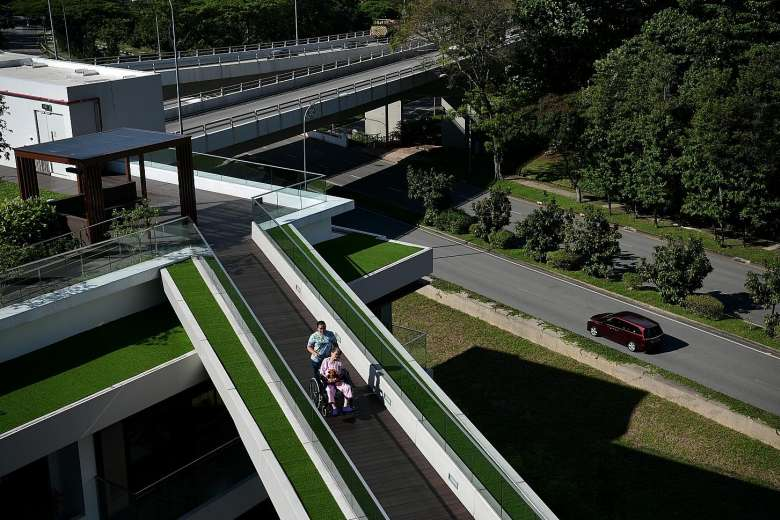Palliative care for dementia patients
published by The Straits Times on April 11, 2017
Madam Liow Ah Tay, 87, has struggled with dementia for the last decade. Now as her health declines further, she had been admitted into the first hospice ward here for dementia patients.In 2007, the former vegetable seller started displaying strange behaviour. At 3am every day, she would wake up to prepare to go to the market to open her stall, even though by then she had long retired from the trade. Her children refused to let her go out at that hour and she would force open the door with a pair of scissors or a knife. They discovered then that she had mild dementia.
Five years later, her condition deteriorated further. She accused people of stealing her things. Whenever her children – those who did not live with her – went to visit her, she treated them as guests and entertained them. Today, Madam Liow has advanced dementia – the feisty woman has become quiet and no longer recognises her daughters. On some days, she even has trouble sitting up.
Her two daughters who look after her are relieved that she is among the pioneer batch of patients to be cared for in the first hospice ward here dedicated to people with advanced dementia. She was admitted in January.
Dr Shirlynn Ho from Assisi Hospice said not many people know that dementia does kill and that palliative care could be needed. “People don’t usually recognise dementia as a terminal illness that one can die from because it is a long and progressive disease,” she said.
The hospice opened a dementia ward which has a capacity of 16 beds in January. It provides palliative care that specially caters to people with severe dementia so that they can spend their last days in comfort and dignity.
The ward will be officially launched tomorrow.
Temasek Foundation Cares donated $1.6 million to support the programme. Patients pay $295 a day, before subsidies. Ten beds have already been taken. More people are likely to need such a service, given the country’s galloping rates of dementia. The disease affects about 40,000 people in Singapore, and the number is expected to double by 2030.
Prior to the setting up of this ward, those with advanced dementia mostly live and die at home or in nursing homes. Even though the number of dementia patients is soaring, one reason why hospices globally do not support enough of them is that it is particularly challenging for doctors to determine with much precision how long a person with advanced dementia can expect to live.
In the United States, for instance, hospices admit only people who have six months or less to live. Dementia patients are under-enrolled in hospice programmes there because doctors cannot identify those likely to die within that time span. The programme at Assisi Hospice takes in dementia patients with a prognosis of three months – meaning those with advanced dementia or those with mild to moderate dementia and other life-limiting diseases that give them that prognosis. “Dementia shortens life expectancy, but it is very difficult to know how long they will live. As the end of life approaches, they experience symptoms similar to those of persons dying of more commonly recognised terminal illnesses such as cancer,” said Dr Ho.
Dementia is an illness which affects the brain. Brain cells die at a faster rate than normal and those with advanced dementia usually have memory loss and lose the ability to shower, walk, talk or even eat. They become frail, bed-bound and prone to infections. They die when they get a major infection such as pneumonia or when their body systems shut down.
The dementia programme at Assisi provides the usual palliative care of pain and symptom relief. Staff also try to understand the patient’s past and needs in order to address challenging behaviour. For instance, Madam Liow used to insist on entering the kitchen at 6pm every day, wanting to cook dinner for her children. So nurses at the hospice gave her bowls and plates to play with safely instead. As dementia patients tend to wander around and get lost, the ward doors are locked automatically. Slim grilles are fitted at the balcony to ensure safety but allow for unobstructed views. Said Ms Lee Poh Peng, 48, Madam Liow’s daughter: “She used to be very agitated but she is much calmer and at peace now. We still worry for her but we worry less now.”

